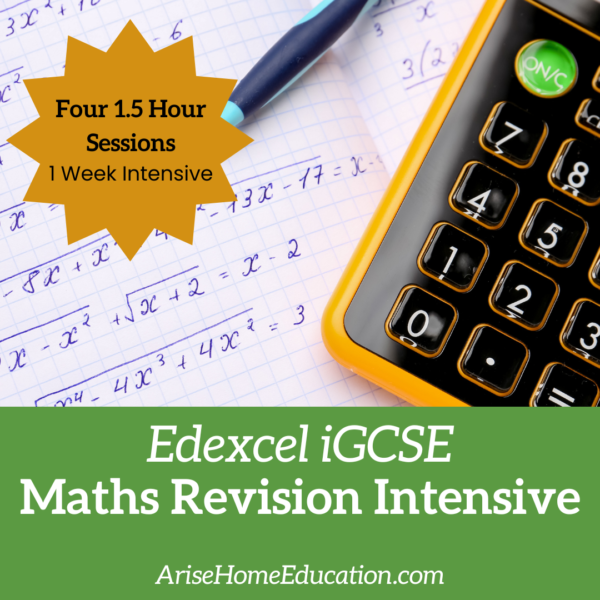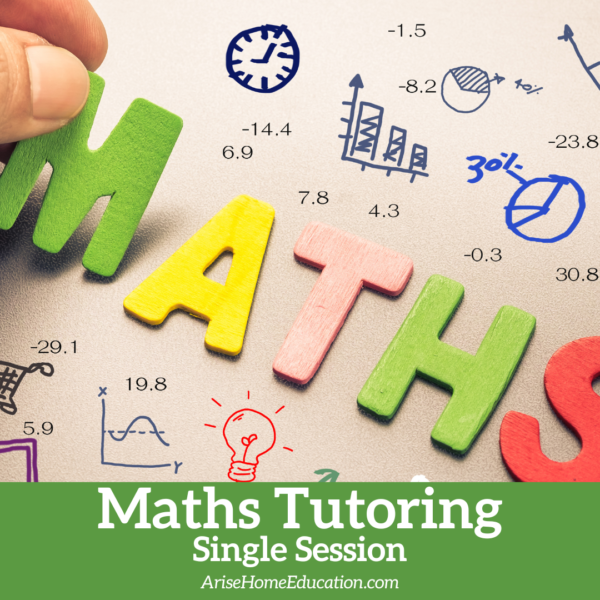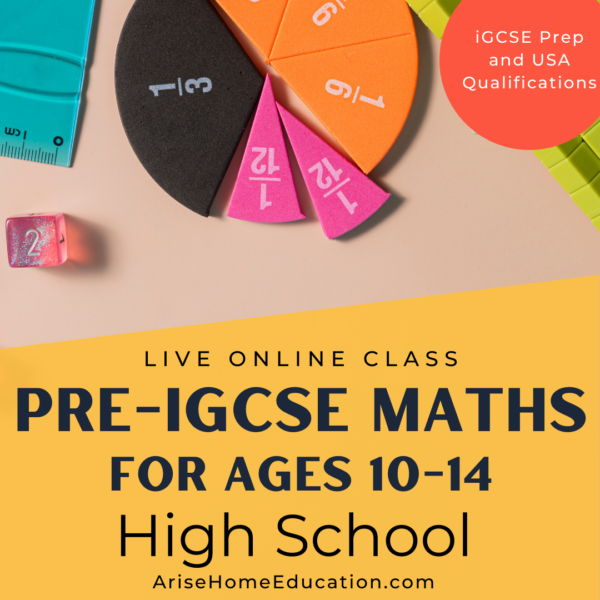
Homeschool Maths | Top UK Curriculum & Free Activities
I believe there are few families who have not had tears over homeschool maths! Many children find this a challenging area, even those children who go on to achieve high grades often have times when they struggle. As home-educating mothers, this can be rather scary and discouraging. We can feel that weight of responsibility and the desire to alleviate the stress our children are feeling. It can sometimes take time to find the curriculum that is the best fit for your child’s learning style. It is important to note that many curriculum providers provide grade-level placement tests, a free trial, sample lesson plans, and other free resources to help you decide what is right for you.
ying the Foundation for iGCSE Maths
What are the key skills required for starting iGCSE Maths? Knowing that your teen is ready for the step up to iGCSE maths can be challenging, and knowing how best to prepare a younger teen to be ready when the time is right can be challenging.
As a home educator, I have found it difficult to find a good curriculum for my younger teens. There are many good maths curricula for primary-aged children. But the UK’s early high school curriculum is harder to find. Therefore, we have worked hard to create a maths curriculum to prepare students for iGCSE maths.
Taking Homeschool Maths Slow
As home educators, we are not beholden to the schedules of the school system. If your child is struggling with an area, we can slow the pace down. With one of my children, we were doing fractions. The lessons had been incrementally building, and we were now at the place where these concepts were being combined. The lesson was fraction arithmetic: taking different fractions, having to change mixed fractions to improper fractions, creating equivalent fractions, performing the actual sum, then back from improper to mixed, and simplifying the answer to lowest terms. Although each step had been practised, bringing them all together caused a lot of stress. So we slowed down. We sat together. I have a whiteboard I use every day, and it has been a key part of our days. We did only a few questions, but slowly went through each stage, explaining, showing, and repeating. My son was able to slowly show me how to go through the steps, with me guiding him back if he made a misstep.
That day, we did not do 20 questions, but we did a solid block of maths. It is important to remember that quantity is not always quality. And Charlotte Mason’s wisdom of shorter lessons is often more effective than a longer one.
Add Variety to Homeschool Maths
Carrying on from the fractions example above. That season of fractions came to an end, and a new discipline was begun: and we were pleased! If you find you are becoming bogged down, have a break, and do something different.
- Project work: We can think of projects as something for the humanities. However, we can do maths projects. Look at the life and work of a mathematician. Enjoy mathematical games and activities, exploring their work.
- Maths game: Some families make Friday’s maths games. This is a time to explore and enhance key skills, ideas, or memorization work through fun!
- Mathematical thinking activities: these can be thought of as maths games for older kids. The Nrich website by Cambridge University is an excellent resource. This is a particularly good place for kids who are skilled in mathematics. These thinking and logic problems allow kids to think more deeply about mathematical ideas. It is interesting that this is an area now being championed on university campuses.
- Weekly Maths Challenge: doing something a bit different regularly helps to make learning fun. This can be a good way to engage a more competitive student.
Understanding Learning Differences.
Although dyslexia is a language problem, it does affect maths learning. A poor working memory has implications for a child’s ability when thinking through problems that are more complex. It also makes maths memorisation very difficult.
I believe that mathematical comprehension skills are of more value than memorising the times tables. Although times table memorisation has real, deep value. But if this is something that a child finds enormously difficult, try freeing them by giving a child a times table grid.
When a child has dyscalculia, there is a developmental problem with the processing of information. This makes it hard for a child to understand mathematical concepts. If you have a child with dyscalculia, conventional maths teaching will be enormously frustrating. Focus on understanding concepts and how to visualise them. Maths resources and curriculum that rely on manipulatives. Finding the right homeschool maths curriculum may take some time. A place to start might be a Montessori-based curriculum would be worth looking at, like Shiller Math. Play maths games and dominoes. Work on helping a child recognise patterns and understand basic mathematical language.
Sadly, there are fewer resources for dyscalculia than there are for dyslexia. If you suspect your child has dyscalculia, take time to do research into the best resources to help. Helping your child to navigate maths with grace and patience, to minimise maths anxiety, will be key to their success in mathematics.
When there is a maths struggle, word problems may be more difficult. If this is the case, work on mathematical language. Work on a child recognizing words like: sum, difference, product, quotient, increase, decrease, etc. Using maths language in daily life will help children become comfortable with maths in real-life applications and use these essential skills in everyday life; it will also mean that when they encounter these terms in a maths lesson, they will know what they mean.
-
Product on sale
 Maths Revision Bundle | iGCSE Maths 1 Week IntensiveOriginal price was: £140.00.£25.00Current price is: £25.00.
Maths Revision Bundle | iGCSE Maths 1 Week IntensiveOriginal price was: £140.00.£25.00Current price is: £25.00. -
 Math Facts Chart Printable + Cheat Sheets£7.60
Math Facts Chart Printable + Cheat Sheets£7.60 -
 Maths Tutoring: 4-Session Bundle£100.00
Maths Tutoring: 4-Session Bundle£100.00 -
 Higher Maths SQA£450.00
Higher Maths SQA£450.00
Homeschool Maths Activities for Success
Taking time to regularly do games, and making space for review, is beneficial for maths success. As your child becomes older and is working towards exams, having review built into your weeks is helpful.
National 5s, iGCSE/GCSE, Higher, and A-level maths are all content-heavy. Schedule a review day every few weeks. As you review, circle back around to the material you covered previously. In your cycle, touch base with concepts you did months ago, so that when revision time comes back around, you are not re-learning everything in the curriculum.
Use interactive software to help grasp key concepts. Using online websites like pHET and GeoGebra helps to unlock understanding of abstract ideas. These are like the manipulatives we use with elementary school-aged kids.
End the year or the term with fun end-of-year maths activities. Have a maths party! So many kids hate maths, so creating fun, memorable times in our homes that have maths at the centre creates positive memories around maths.
If your child is finding a concept challenging, it can be helpful to try a different explanation. Websites like Khan Academy can be useful to allow someone else to present an idea; their instructional videos can offer insightful ideas. Or you may want to explore one-off tutoring sessions.
Games to Help Homeschool Maths and Language Learning
Planning maths games not only allows kids to work on math skills, but it can also cement maths language. Understanding maths language is key to unlocking those work or story problems kids hate. So often a child struggles with word problems, it is because they are failing to pick up on those key maths words, like sum or difference, for example.
As well as working on skills, games also work on critical thinking. Seemingly simple games can have profound mathematical ideas embedded in them. It is not necessary to have complex problems to build these key skills. Furthermore, it is not always necessary to have expensive manipulatives to teach with. Have a look at Maths Week Scotland’s Outdoor maths activities for inspiration.
Homeschool Maths Freebies
-
Product on sale
 iGCSE Maths Sample LessonOriginal price was: £5.00.£0.00Current price is: £0.00.
iGCSE Maths Sample LessonOriginal price was: £5.00.£0.00Current price is: £0.00.
You can also download the free Hexagon Hop game with Arise Home Education. This game will help with key terms like factors, multiples, and prime numbers.
Finding the Best Homeschool Maths Curriculum
Whether you are looking for maths resources for high school students or primary-aged kids, finding the best homeschool maths curriculum is not always easy. Personally, it has been the hardest subject to find something that has worked for my children, and we have tried a few over the years, from Singapore Math, to Math-U-See curriculum, Heinemann Maths, TeeJay Maths, Maths No Problem, Galore Park…
If you are on the lookout for a different curriculum, do your research. Consider your child’s learning style.
- Ask questions of other home educators – everyone likes talking about curriculum: right!
- Look for free trials, or sample printable worksheets that can give you an idea it will work for your child.
- Also, look for curricula that have a placement test; this not only allows you to identify areas requiring work, but it can also provide insight into whether different programs are right for you.
If maths is an area you struggle with, consider a maths curriculum that is either a live online class, video lessons, or another type of online maths program. This may also be true for the busy homeschool mom who needs some extra support. There are so many homeschool maths curriculum choices. However, it is important to know there is no such thing as the perfect or best maths curriculum! I think as home educators, we can all be tempted to chop and change curricula, in the hope that the next one will be the right maths program.
Are Arise Live Classes A Good Fit For Your Teen?
Grab a live lesson bundle and learn about the course, the tutor, and the weekly homework load.
What Are The Important Homeschool Maths Questions To Ask?
- Will this curriculum give a solid math foundation?
- Does it suit my child’s learning style?
- Is it the correct difficulty level?
- Do we need any specific set of skills to be covered?
- Is this the correct learning path for my child?
Homeschool Maths Success
Whether you are planning on sitting UK maths exams or following the US model for high school math (Algebra 1, Algebra 2, Geometry, and beyond). There is a homeschool maths success path that is right for your family. If you aren’t sure which path would best suit your family or if you have other home education questions, these resources will help you find your path to success.










